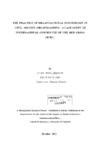| dc.description.abstract | Organizational Psychology is applied to the workplace as to measure: attitudes of employees
and employers, organizational behaviour, workplace environment and its effects, and much,
much more. It studies such things as personality, cognition, perception, and human
development. It looks about the biological side of behaviour (which means it really discovers
what chemicals aren't at proper levels in a person with a chemical imbalance). Therefore,
psychology plays major role in improving human relations and in solving industrial dispute.
Psychology also helps in explaining difference in individuals relating to interests, aptitudes,
specialties, intelligence etc. and so in results helps in explaining about a better person
personality and requirements that are required in an individual to perform a particular job.
The objective of the study was to determine the practice of organizational psychology by
International Committee of the Red Cross. The study employed case study design in addressing
the practice of organizational psychology. This study used the semi-structured interviews in
order to allow for flexibility and probing where necessary because it seeks complete
understanding of research issues. Personal interviews were done where the researcher asked
questions in a face-to-face contact with the interviewee. The interview had structured questions
accompanied by probing questions when the need arises to allow for elaboration since the
study seeks to get in depth information. The orders of the questions were varied depending on
the flow of the conversation. Supplementary questions were asked or other questions omitted if
the situation so required. Unstructured interview was not used because it was likely to provide
many disjointed items of information that would have been difficult to fit together into a
coherent picture. The researcher interviewed top managers. General information about the
study analysis was done in terms of measures of frequency, measures of central tendency or
dispersion using SPSS software package. The results of analysis were presented in tables, and
short descriptions. The practices of organizational psychology were analyzed through
narrations.
The findings also highlighted that most of the managers interviewed had standardised
selection procedures for use with new hires. However, a few departments without a standard
procedure were in the process of designing one, and several Human Resources managers
mentioned that their standard procedures had been introduced only recently.
This suggested that ICRC was quickly moving towards an environment where it will be
expected that all organisations have standardised selection procedures.
Few Human Resources Managers described goal setting either manager-directed goals or
goals set collaboratively as part of everyday motivational practice. Of the cases where goal
setting was mentioned, managers usually set goals without getting input from employees.
Directed goals had been repeatedly found to be more effective than no goals. However,
employee participation in goal-setting increased employees’ beliefs in their ability to achieve
the goals, and such participation was likely to be particularly important for complex tasks.
One department paid close attention to collaborative goal setting. Employees were involved in
setting some organisational goals through the use of a centre of excellence and a learning and
development team, which identified work improvement and learning opportunities and
formed strategies to meet those opportunities. Such involvement was likely to increase
employee commitment to the organisation’s goals, thus increasing effort towards meeting
those goals as well as improving work morale and satisfaction
The study was limited to a number of factors such as the number of interviewed managers.
There was also limitation where the senior management was biased on the response they gave
on various practices. The study recommended further research to be carried out in future to
evaluate the success of the practices of organizational psychology. | en_US |



